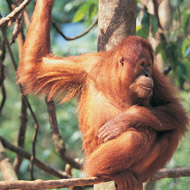
Information will be used to support law enforcement efforts
Over 1,800 great apes were seized from an illicit live traffic that went undetected for over a decade, according to the Great Apes Survival Partnership (GRASP).
Seizure records in the Apes Seizure Database show over 90 per cent of all seizures occurred within national borders and were therefore not recorded in illegal trade databases. As a result, the trade in endangered and critically endangered great apes was dramatically under-reported.
“Any illegal trade in great apes — whether it crosses international borders or not — needs to be considered a very real threat to the survival of these endangered species,” said UN environment executive director Erik Solheim. “I visited Borneo recently and saw for myself the incredible pressure orangutans are under from habitat loss, and African apes are equally stressed. Illegal trade can only push them all that much closer to extinction, and it needs to be stopped.”
The Apes Seizure Database was created by the Great Apes Survival Partnership (GRASP), in collaboration with the United Nations Environment -World Conservation Monitoring Centre (UNEP-WCMC). Its data comes from GRASP’s broad alliance of 105 national governments, research institutions, conservation organisations and UN agencies, which was then verified by a technical advisory group.
Orangutans comprise 67 per cent of all entries in the Database, thanks to the huge expansion of agricultural industries such as palm oil and pulp and paper in Borneo and Sumatra. Chimpanzees are next at 24 per cent, with gorillas (six per cent) and bonobos (three per cent) also impacted.
“For too long, the illegal trade in great apes was anecdotal, and therefore difficult to judge in terms of scale and scope,” said Doug Cress, programme coordinator of GRASP. “But with the Apes Seizure Database, the numbers are plain to see. It doesn’t take long to identify areas of concern in Africa or Asia, or recognise that critically endangered species are in extreme danger.”
GRASP say the information will be used to support monitoring and law enforcement efforts against environmental crime.



 The BSAVA has opened submissions for the BSAVA Clinical Research Abstracts 2026.
The BSAVA has opened submissions for the BSAVA Clinical Research Abstracts 2026.